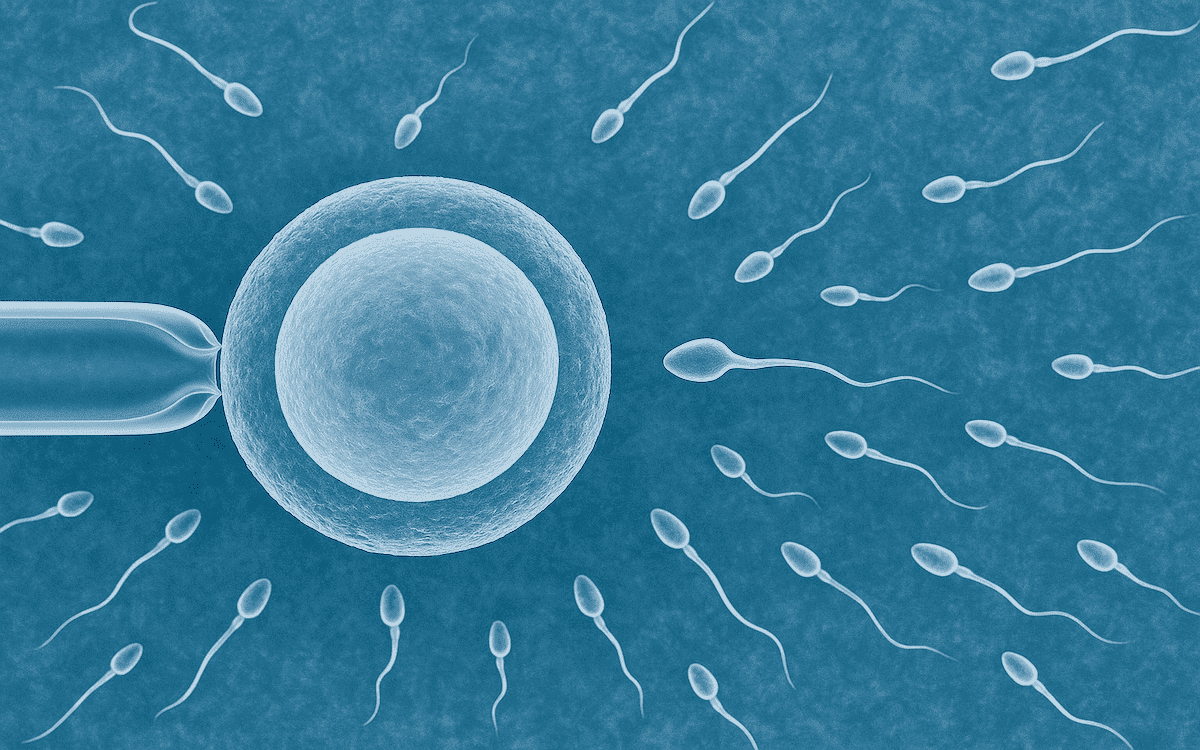IVF Fertilization Failure: The Hidden Sperm Factors Behind It

Mona Bungum
Article
7 min

Discover the hidden sperm factors behind IVF fertilization failure from DNA damage to oxidative stress and how Conceivio helps improve fertility outcomes.
When couples go through in vitro fertilization (IVF), most of the attention often falls on the eggs, their quality, number, and maturity. But when fertilization doesn’t happen as expected, the cause is not always the egg. In many cases, IVF fertilization failure is linked to hidden sperm-related factors that standard tests miss.
Quick Answer: Even with normal semen analysis results, poor fertilization after IVF can occur due to sperm DNA fragmentation, oxidative stress, or molecular defects that affect sperm–egg interaction. These issues are often reversible with medical evaluation, lifestyle changes, and targeted treatments such as ICSI or antioxidant therapy.
When Fertilization Fails Despite Normal Results
Semen analysis remains the first step in assessing male fertility. It measures sperm count, movement (motility), and shape (morphology). But these are only surface-level indicators.
A man’s sample can look “normal” under the microscope yet still contain hidden problems that prevent sperm from properly binding with or fertilizing the egg. When this happens during IVF, embryos fail to develop, leaving couples confused and frustrated.
The solution lies in looking deeper beyond what traditional tests can see.
1. Sperm DNA Fragmentation
Even healthy-looking sperm can carry DNA breaks that interfere with embryo formation. Studies show that high DNA fragmentation reduces fertilization rates and increases the risk of miscarriage.
These DNA breaks can result from oxidative stress, smoking, poor diet, or environmental toxins. Men who work long hours, experience high stress, or are exposed to heat and pollution may unknowingly damage sperm DNA over time.
Tests such as the TUNEL or SCSA assay can detect this damage. Treating it often involves antioxidants, lifestyle changes, or shifting to techniques like ICSI, where a single, healthy sperm is carefully injected into an egg.
To understand more about this topic, see what is sperm DNA fragmentation.
2. Oxidative Stress and Sperm Health
Oxidative stress occurs when the body produces more reactive oxygen species (ROS) than it can neutralize. These unstable molecules can damage sperm membranes, impair motility, and harm genetic material.
Sperm are especially vulnerable because they contain limited antioxidant defenses. In IVF, high oxidative stress can reduce fertilization rates even when sperm counts appear normal.
Antioxidant-rich diets including foods high in vitamins C and E, zinc, and selenium help restore balance. Limiting alcohol, quitting smoking, and managing stress also protect sperm from oxidative injury.
To explore how stress and hormone balance affect fertility, visit testosterone, stress, and male fertility.
3. Epigenetic and Molecular Changes
Sperm carry not just DNA but also epigenetic markers chemical tags that influence how genes are expressed. These can be affected by age, diet, smoking, or toxins.
Altered sperm epigenetics can disrupt early embryo development and even influence a child’s long-term health. For example, men with obesity or chronic stress often show differences in sperm methylation patterns, which may lower fertilization success rates in IVF.
Healthy nutrition, weight management, and antioxidant therapy can help restore epigenetic balance and improve overall sperm function.
4. Problems in Sperm–Oocyte Interaction
For fertilization to happen, sperm must recognize, bind to, and penetrate the egg’s outer layer (zona pellucida). Some sperm, even with normal counts and motility, lack the enzymes or membrane proteins necessary for this process.
This explains cases of total fertilization failure where sperm fail to bind to eggs during standard IVF, despite looking normal.
Techniques like ICSI (Intracytoplasmic Sperm Injection) bypass these issues by directly inserting a single sperm into the egg, often leading to successful fertilization where conventional IVF fails.
If you’re exploring assisted conception, you might find how to become a parent with fertility treatment a useful overview of the process.
5. When ICSI Doesn’t Work: The Deeper Layers
Although ICSI has improved fertilization rates for many couples, it doesn’t always solve the problem. When fertilization remains poor even after ICSI, the underlying cause may involve severe DNA damage, chromatin condensation issues, or sperm energy defects.
These deeper factors often require advanced testing, such as mitochondrial function analysis or sperm proteomics. In some cases, surgical sperm retrieval from the testes (testicular sperm extraction) may yield better results than using ejaculated sperm, as testicular samples are often less damaged by oxidative stress.
For a broader look at sperm assessment techniques, visit sperm analysis test: what science reveals about male fertility.
Lifestyle Factors That May Influence Fertilization Success
While genetics and medical factors matter, daily habits strongly influence sperm quality and by extension, IVF outcomes.
- Nutrition: A diet rich in fruits, vegetables, nuts, and whole grains provides antioxidants that protect sperm DNA.
- Exercise: Regular physical activity improves hormone balance and reduces inflammation.
- Sleep and stress management: Chronic stress and sleep deprivation affect testosterone and sperm production.
- Avoiding toxins: Limit exposure to heat, plastics (BPA), pesticides, and heavy metals.
- Alcohol and smoking: Both significantly increase oxidative stress and DNA damage.
For a practical approach, read how to improve sperm health with practical steps.
Understanding Fertilization Failure in IVF
Fertilization failure is devastating but rarely final. Identifying and addressing hidden sperm factors allows doctors to create more precise treatment strategies.
In many cases, improving sperm quality leads to higher fertilization and embryo development rates. Couples can often achieve success through repeat cycles or advanced lab techniques tailored to their specific diagnosis.
Even for men with severe sperm issues, technologies like micro-TESE and AI-assisted sperm selection offer new hope.
The Bigger Picture: Fertility Is a Shared Journey
Infertility is not a woman’s issue, it’s a couple’s challenge. When clinics and couples evaluate both partners equally, outcomes improve dramatically.
Men who understand and address their fertility health contribute not only to conception success but also to the long-term health of their future children.
Awareness of sperm health is growing, but stigma remains. Open conversations and accessible resources, such as male infertility: what no one tells you and why it matters, can help men approach the topic confidently.
FAQs About IVF Fertilization Failure
Can fertilization fail in IVF?
Yes. Fertilization can fail in IVF when sperm cannot bind to or penetrate the egg, or when hidden sperm issues such as DNA fragmentation or oxidative stress affect embryo development. These causes are often treatable with advanced testing and ICSI.
Can stress cause IVF failure?
Chronic stress can indirectly affect IVF outcomes by disrupting hormone balance, reducing sperm and egg quality, and impairing sleep and metabolism. Managing stress through mindfulness and healthy routines supports both fertility and emotional wellbeing.
When do most IVF miscarriages occur?
Most miscarriages after IVF happen within the first trimester, often due to chromosomal abnormalities in the embryo. High sperm DNA fragmentation can also increase miscarriage risk by affecting embryo stability and implantation.
Why did my eggs not fertilise in IVF?
When eggs fail to fertilize, sperm-related issues are often involved. Problems such as enzyme defects, DNA damage, or oxidative stress can prevent the sperm from fusing with the egg even when semen analysis looks normal.
Why did my IVF fail with good embryos?
Even with high-quality embryos, IVF can fail if there are hidden sperm or uterine factors. Sperm DNA damage or poor embryo implantation environment can affect success rates. Comprehensive fertility evaluation for both partners helps identify these issues early.
How can I improve sperm quality for IVF?
A balanced diet, regular moderate exercise, quitting smoking, reducing alcohol, and managing stress can all enhance sperm health. Antioxidant-rich foods and proper sleep are especially beneficial. You can learn more from how to improve sperm health: practical steps.
The Conceivio Approach
At Conceivio, we believe fertility care should be comprehensive, integrating science, lifestyle, and emotional support.
Our tools and expert insights empower men to understand their fertility in a clear, data-driven way. Whether through education, coaching, or evidence-based guidance, we help couples take control of their journey with confidence.
Because addressing hidden sperm factors is not just about improving fertilization, it’s about understanding health as a whole.
Conclusion
When fertilization fails after IVF, the cause often lies beyond what the microscope can see. Sperm DNA integrity, oxidative stress, and molecular imbalances all play major roles in whether an embryo forms successfully.
By identifying and treating these hidden sperm factors, couples can turn disappointment into progress. Fertility is a partnership and understanding both sides of the equation gives science, and hope, the best chance to succeed.


















